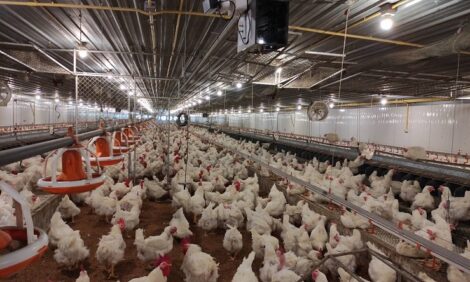



Agency Calls for National Ban on Cephalosporins
CANADA - The country's health agency should ban the use of antibiotics - particularly cephalosporins - in poultry farming nationwide because of antibiotic resistance problems in humans.Montreal Gazette reports that antibiotics injected into poultry and eggs to reduce the spread of infection may be making people less susceptible to important antibiotic treatment.
The call comes from the Public Health Agency of Canada, which adds that Health Canada should ban the use of cephalosporins in agriculture because — although the drugs are effective in reducing the spread of illness in animals — they were not intended to be used in farming, and the effects of eating animals treated with the antibiotics are unknown.
Common examples of cephalosporins are the human antibiotics Cefzil, which treats bronchitis, ear infections and skin infections, and Ceftriaxone, used to treat mild pneumonia, bacterial meningitis and gonorrhea.
Health Canada says banning farm use of the antibiotic is a provincial matter. However, if the drugs are shown to be a risk to human safety, the government body can act.
"Health Canada could introduce regulations to ban the sale of certain drugs for use in food animals, and prohibit the sale of animals treated with these drugs for food. These regulations are enforceable," Health Canada spokesman Stephane Shank said in an interview published on the Canadian Medical Association Journal web site.
Currently, Health Canada has only been able to introduce non-binding labels warning against the use of cephalosporin in agriculture. Critics say this does nothing, and challenge the federal body to acknowledge the growing public health problem, and to take action.
The Canadian Integrated Program for Antimicrobial Resistance has been tracking the use of antibiotics in food and on farms since 2002. Using a $3-million annual contribution from Public Health, it found cephalosporin resistance in humans corresponds strongly to the use of the drug in poultry production.
Levels were so high in Ontario and Quebec in 2005, poultry producers voluntarily stopped using the antibiotic.
CIPARS director Rebecca Irwin told the CMAJ that the temporary ban, predictably, reduced antibiotic resistance in humans. However, since the ban was lifted in 2007, resistance has again risen.
"Taken in context with all the other knowledge we have, anyone still opposing a link between antibiotic use in food-animal production and direct human-health impact does so for other reasons than science," Frank Aarestrup, a specialist in antibiotic resistance with the Danish Technical University in Copenhagen, told the CMAJ.
Montreal Gazette says the problem is Canada-wide and is affecting more than just health. The European Union threatened to stop buying Canadian poultry after an EU review in 2000 of Canadian meat products found the country's meat failed to live up to European safety standards, largely due to inadequate restrictions on human antibiotics used in animals. The Canadian government promised at the time that they would introduce laws to curb antibiotic use, but the national study that came out of that promise was eventually abandoned.
Since then, in 2002 and 2004, separate government advisory committees have told the government to develop a stricter policy on using human antibiotics in the food chain. The 2004 committee found farmers were importing "unapproved products," and the lax guidelines were allowing farmers to make their own drug mixes – possibly containing human drugs or unapproved drug products.
In 2008, in reaction to both reports, the federal government adopted a non-binding and unenforceable policy requiring safety advisories against using human antibiotics in animals to be added to the buckets or packages that the antibiotics come in.
Jim Hutchinson, chairman of the Canadian Committee of Antimicrobial Resistance, told CMAJ the new labelling fell far short of the mark.
"Antimicrobial resistance is one of the biggest health problems confronting the planet," he said, reports Montreal Gazette. "There is need for federal oversight on this. But the overriding interest seems not to be in human health. And that is a problem for Canadians."








